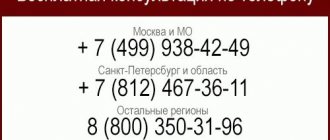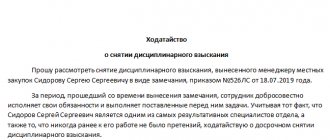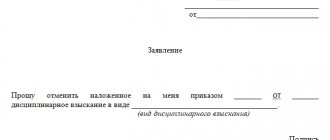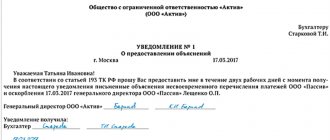A reprimand is a type of disciplinary sanction, and it can be applied for serious violations of labor discipline. The natural consequence is often dismissal, so employees need to know how to appeal it and within what time frame.
Literally, a reprimand is a punishment applied by an employer against an employee who has committed a deliberate violation. It has legal force only if the corresponding order is issued. A verbal reprimand is equivalent to a reprimand, so if a manager wants to punish a subordinate according to the letter of the law, he will have to follow the algorithm of actions and draw up documents confirming the legality of the penalty. Read also the article ⇒ Reprimand to an employee for failure to fulfill job duties.
General provisions on disciplinary action
The articles of the Labor Code establish that the administration can carry out disciplinary sanctions against its employees in the following form:
- Remarks - established for minor employee misconduct and failure to fulfill duties.
- Reprimand - it can last for one month, after which it is removed. It is important to remember that the concept of a strict reprimand does not exist.
- Dismissals are established for serious offenses.
Establishing disciplinary liability requires studying the materials of the misconduct and recording all the facts in paper form that determine the guilt of the employee. The procedure should begin with obtaining an explanation from the perpetrator.
When management decides on the choice of punishment, they must take into account the severity of the misconduct of the guilty employee, as well as the circumstances that accompanied the violation.
Legislation, as well as the enterprise's Regulations on Penalty, may provide for other penalties not prohibited by the code for certain categories of employees. However, the use of such measures as a fine or deprivation of bonuses is unlawful.
Attention! An important point when establishing a disciplinary sanction is that its basis is an order of the head of the company, signed by the director.
If the employee believes that he was subjected to this responsibility unfairly, they will appeal the disciplinary action.
For these purposes, he can draw up and submit an application to the following authorities:
- Labor Dispute Commission.
- State Labor Inspectorate.
- To court.
Attention! An offended employee can apply to the judicial authorities immediately as soon as he decides that his rights have been violated, or he can try to restore his rights pre-trial through a commission or labor inspectorate.
Grounds for disciplinary action
Labor legislation provides for many rights and obligations of participants in labor relations, as well as guarantees of their compliance. For any employer, compliance by employees with labor discipline is the key to stable and uninterrupted operation of the enterprise.
Disciplinary liability may occur in cases where an employee violates the following acts:
- direct norms of legislative acts establishing requirements for labor discipline;
- internal acts of the enterprise (internal labor regulations, etc.);
- terms of the employment contract concluded between management and employee.
Thus, every employee must be made aware of the current labor discipline standards upon employment and must comply throughout the entire period of work at the enterprise.
This is also important to know:
Who imposes a disciplinary sanction for violating sanitary legislation and what is the procedure for registration
Each case of violation of discipline is subject not only to detection by management, but also to recording in the materials of the internal investigation. Only based on the results of the investigation and the employee being given the right to present his objections, the employer can apply one of the following disciplinary sanctions:
- comment;
- rebuke;
- dismissal.
The choice of possible sanctions is the right of management, and dismissal can only be applied in exceptional cases regulated by the Labor Code of the Russian Federation (for example, absenteeism or going to work while intoxicated).
The fact of disciplinary action must be confirmed by the publication of an administrative act by the head of the enterprise. This document must indicate:
- employer's name;
- date and order number;
- indication of the basis for bringing to responsibility;
- reference to the norm of the Labor Code of the Russian Federation;
- type of sanction applied.
This act is provided to the employee for review on the day of its publication, and the refusal to sign the order is formalized by a commission act. From this moment the period for appealing the order to impose disciplinary liability begins.
Free legal consultation
We will answer your question in 5 minutes!
Free legal consultation We will answer your question in 5 minutes!
Ask a Question
Ask a Question
Grounds for appealing a collection order
Challenging a disciplinary sanction requires mandatory clarification of the grounds in order to challenge the order. After all, only indicating the reasons for the appeal will allow the penalties imposed on the employee to be reviewed.
There are the following grounds on which an established disciplinary sanction may be appealed:
- Procedural - that is, in the process of bringing the employee to disciplinary liability, the procedure for imposing penalties on him was violated. Thus, the release from liability is not because he is not guilty, but because of a violation of the procedure, which includes obtaining an explanation of what happened from the offender (2 days), issuing an order to hold him accountable, and drawing up an act on the employee’s refusal to sign the order. It is important to remember that any failure to follow the procedure may be grounds for a challenge.
- Material - when the employee considers himself completely not guilty, and the imposition of a penalty is illegal. In this case, these grounds depend entirely on the circumstances of the case.
Can I challenge it at work?
In response to unreasonable actions, the employee has the legal right to appeal the employer’s disciplinary reprimand.
It is also worth considering that a reprimand has no legal force if the employee does not provide a written explanation (the exception is the employee’s refusal to provide written explanations).
At least two days are given to write an explanatory note, which means that preparing the necessary documents for issuing a reprimand also lasts about two days.
You can also challenge a disciplinary sanction for a violation that was committed later than six months, since a certain period is also set for issuing a reprimand.
Disciplinary action may not be appropriate in some situations. For example, being late for work by just a few minutes. In this case, the employee has the right to challenge the reprimand, since its use is not justified in this situation.
Another compelling argument for appealing a reprimand can be a situation where a violation of labor discipline or duties occurred for reasons that were not dependent on the employee, and he could not influence the course of events in any way. This applies to car accidents, emergencies and some other life circumstances.
In order to challenge the punishment, the employee will have to indicate in the explanatory note the presence of documents that can confirm his innocence.
How to prove your innocence?
In a situation where a punished employee does not agree with the charges brought against him, he, according to the norms, can defend his innocence. For this purpose, the employee is recommended to draw up an explanatory note addressed to management.
This document describes in detail the current situation and provides all the facts confirming his innocence. If the employee can confirm the absence of his guilt with the help of witnesses, then he can involve their testimony and explanations.
If management ignores the document submitted by the employee, he can turn to the competent authorities to protect his rights. To do this, he simply chooses a way to challenge the disciplinary sanction imposed on him.
You might be interested in:
Complaint to the labor inspectorate: what are the grounds for filing, how to file, controversial issues
FAQ
Question No. 1. Can my boss fire me for absenteeism if I already have a reprimand for being late?
To dismiss for absenteeism, it is not necessary to have a valid penalty - the manager can do this on the basis of Art. 81 Labor Code of the Russian Federation.
Question No. 2. If an employee does not come to work for a good reason, do I need to provide evidence?
Yes, this is necessary, otherwise the employer has every right to reprimand. If the cause was an accident, illness, accident with a loved one, you will need supporting certificates.
Form and deadlines for filing an appeal
Russian legislation establishes the time limits for employees to appeal disciplinary sanctions imposed against them, as well as the procedure for drawing up an application.
Recommended written form
A complaint about a disciplinary sanction must be submitted only in writing. It is recommended that the authority that will review it provide two copies - one will remain in place, and the second will be marked with receipt.
It is advisable to formulate a complaint in the following format:
- Name of the body to which the complaint is sent;
- Information about the applicant - his full name, residential address, contact information;
- Title of appeal;
- Information about the employer - its name, registration codes (if any), information about officials;
- A detailed description of the violation committed;
- Result of the appeal (cancel the order, pay compensation, punish the employer, etc.);
- If necessary, a request to conduct an inspection without disclosing information about the applicant;
- Date and signature;
- List of attached documents.
Attention! The complaint must always contain information about the citizen who is filing it. The law prohibits the consideration of anonymous appeals. If an employee does not want information about him to become known to the employer, he must indicate this in the text of the application.
Period for pre-trial appeal of a disciplinary sanction
You can file a complaint with the labor inspectorate or the Labor Disputes Committee within 3 months from the date of the violation of rights, or within 1 month from the date of dismissal (if it was the result of a disciplinary sanction).
If the statute of limitations has been missed due to a valid reason, then it is necessary to file an appeal to the Committee and attach supporting documents. The circumstances of the omission will be reviewed, and if the outcome is positive, the period will be restored.
Time limit for appealing a disciplinary order in court
Appealing a disciplinary sanction through court is subject to the same deadlines as other claims in labor disputes.
A claim must be filed with the court within 3 months from the date of violation of rights. If an employee was dismissed as a result of a disciplinary sanction, the claim must be filed within 1 month.
An employee may miss the deadline for appealing a disciplinary sanction in court for a good reason (for example, he was in the hospital). In this case, he must provide the court with documents that would confirm this reason.
Attention! If the court considers this to be justified, it will reinstate the deadline for filing the application.
Mistakes that are made in the foreclosure procedure
- No explanation requested. In no case should measures be taken against an employee without finding out the reasons for the misconduct; perhaps his lateness is due to illness or another valid reason. Subsequently, the presentation of evidence by the allegedly guilty party will serve as a cancellation of all measures taken and the collection of compensation from the organization.
- The blame was placed on something that was not initially part of the employee’s duties. It happens that employees are required to perform those works that are outside the scope of their job description, and therefore, they cannot be punished for non-fulfillment, but must be approached to change internal documents, the terms of the employment contract, and only then apply measures.
- Deadlines. Disciplinary measures cannot be applied beyond the deadline. Not only does the employee have deadlines for appealing, but the law also requires the employer to strictly adhere to the time intervals. A month is given for everything; it is during this period that the final decision must be made.
- Repeated punishment for one offense. The rule of one offense = one punishment must be followed in any case. It will be fair. Otherwise, everything will lead to discrimination and violations of workers' rights, which is unacceptable.
This is also important to know:
Injury at work: what should the employer and employee do, who is responsible
Often, simultaneously with recovery, the employer recovers from the employee, for example, recovery of damages from the employee in court. In this case, the process becomes even more complicated. To file an application in court, it is better to seek professional legal assistance; only specialists can competently and correctly, referring to the rules of law and judicial practice, draw up a statement of claim and represent your interests at all stages until a positive solution to the problem. Is it possible to challenge a disciplinary sanction? Now you know that yes, let's do this together.
Where can I appeal a disciplinary sanction?
You can appeal a disciplinary sanction to the labor inspectorate, the labor dispute committee, and, last but not least, to the court.
How to appeal a penalty to the Labor Inspectorate
A complaint against an employer can be filed either in paper form or via the Internet using the Onlineinspektsiya.RF website.
The appeal is made in free form. It must contain the name of the inspection where the document is sent, information about yourself and the employer. Next, the text of the form must state the circumstances of the violation that occurred.
A paper complaint can be brought in person to the government agency, or sent by registered mail with notification.
Based on its results, an audit should be carried out. If the outcome of the case is positive, the inspector will issue an order to cancel the disciplinary punishment.
Appeal by appealing to the Labor Disputes Committee
An appeal against a penalty can be made by contacting the Labor Disputes Committee. It is vested with the authority to consider individual complaints from employees and can be formed, among other things, at the request of employees. Most often, committees operate in those companies where a trade union has been formed.
The application to the Committee is drawn up in free form, which details the circumstances of the event. It is best to make an application in two copies, one will be submitted for consideration, and the second should be marked with receipt.
The application must be reviewed within 10 days from the date of receipt of the application. On the day of consideration of the dispute at the meeting, the employee must be present in person, send his representative, or fill out an application with a request to consider the dispute without the applicant.
Important! You can appeal the Committee's decision in court within 10 days.
Judicial authorities
You can file a claim in court both at the location of the employer and at the place of residence of the employee or actual place of work.
You might be interested in:
Who can receive maternity capital, the amount, what it can be used for in 2021
In a statement of claim to appeal a reprimand or other punishment in court, it is necessary to indicate the circumstances of the violation, indicate the price of the claim (if demanding compensation for moral damage, etc.), and attach supporting documents.
When filing a claim regarding a labor dispute, the employee is exempt from paying state duty.
The applicant or his authorized representative must be present at the trial in person. If the employee or employer has justifiable reasons, the consideration of the case may be suspended and postponed to another time.
Based on the results of the trial, each party will be given a decision.
Important! You can file an appeal against a court decision within 1 month from the date of its delivery.
What should be taken into account when issuing punishments for an employee?
The entire procedure for imposing disciplinary punishment is enshrined in Art. 193 Labor Code of the Russian Federation. It includes:
- Recording the violation committed;
- Requesting written explanations from the employee, which he must provide within 2 business days of receiving the relevant notification;
- The manager makes a decision on the application of the right to recovery and issues the corresponding order.
Important! You should not refuse to give explanations, since in the event of subsequent proceedings, this fact will not work in favor of the employee. It is better to clearly describe all the circumstances of what happened and indicate in the explanations that you were not to blame for what happened. This will make it easier to appeal a disciplinary sanction in the future if it is imposed.
In addition, Art. 192 of the Labor Code of the Russian Federation directly obliges the employer to take into account the severity of the consequences of the offense committed and facts that do not depend on the will of the employee, but influenced the implementation of actions that led to the violation. To make a decision on the application of punishment, the employer is given up to six months from the date of the offense and 1 month from the date of its discovery.
Consequently, the grounds that enable an employee to subsequently have a disciplinary sanction lifted may include:
- Incorrect documentation of punishment for an offense;
- Violation of the terms of imposition of penalties;
- Application by the employer of punishment disproportionate to the offense committed, without taking into account the significant circumstances of its commission;
- Imposing penalties if the employee is not guilty of misconduct.
The main task of an unfairly punished employee who wants to cancel a penalty will be to prove the fact that the employer violated the procedure for applying it, as well as not taking into account mitigating circumstances.
Verification upon application
Based on the results of submitting an application to the labor inspectorate, it will have to conduct an extraordinary inspection. According to general rules, when conducting an inspection, the government agency must notify the company at least 24 hours before it begins.
But in the case when a statement was filed about a violation of an employee’s labor rights, or about any violations committed that pose a threat to the life and health of workers, an inspection is carried out immediately. The employer is not notified.
When appearing at the enterprise, the inspector must present a certificate and an order to conduct an inspection. If it is carried out due to a complaint, the inspector must check only the information specified in the complaint.
The employer may be asked to provide documents that relate to the work activities of the employee who filed the complaint. The inspector cannot request other documents and information that is not related to the purpose of the event.
If during the inspection process any facts are revealed that indicate the presence of other violations, then after the completion of the current visit, a new unscheduled inspection may be initiated.
Attention! Based on the results of the inspection, a report is drawn up listing the violations found. An order is also issued with measures to eliminate violations that the organization is obliged to fulfill.
The inspector is also authorized to issue an administrative fine in accordance with the Code of Administrative Offenses.
Reasons for removal and types
At the moment, the legislation of the Russian Federation does not distinguish certain types of reprimands at work, as in the years under the USSR. There is no legal concept of “severe reprimand”, so familiar in everyday life. The employer can only issue a reprimand or reprimand or dismiss. There is no intermediate type of penalty between a reprimand and dismissal.
A citizen needs to understand that a specific list of things for which one can be reprimanded at work is not spelled out in regulations. In virtually every case, an analysis of the employee’s actions is carried out. The most common reasons:
- repeated absenteeism and tardiness;
- failure to fulfill official duties;
- failure to meet deadlines;
- performing work with manufacturing defects, etc.
Important! A reprimand cannot be declared on the basis of a subjective assessment of work, that is, it is necessary to record and prove failure to fulfill duties regulated by instructions or regulations.
It would be unlawful to reprimand an employee for refusing to work overtime if such an obligation is not specified in the job description. Similarly, refusal to do work of a different nature will not be considered a failure to fulfill duties. An accountant cannot be reprimanded for failing to clean the premises, since cleaning is not part of the job responsibilities of an accounting employee.








